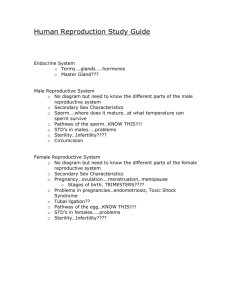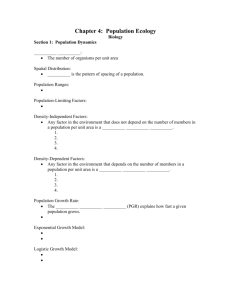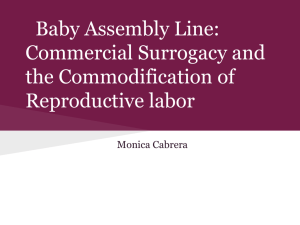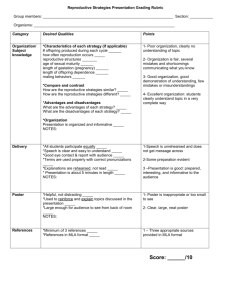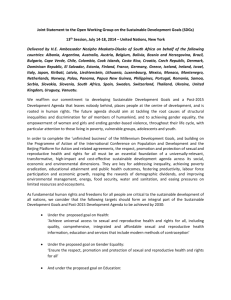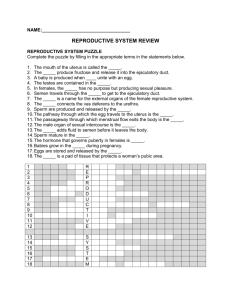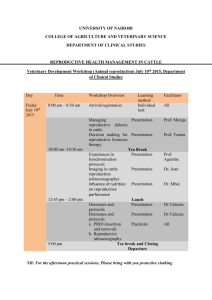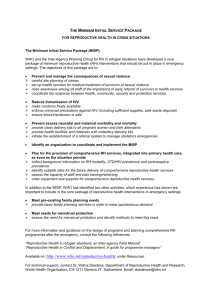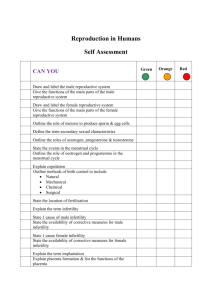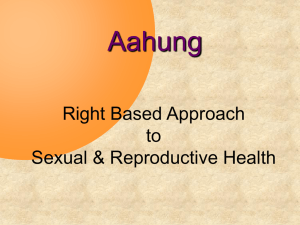Aderibigbe Course Ware On Reproductive
advertisement
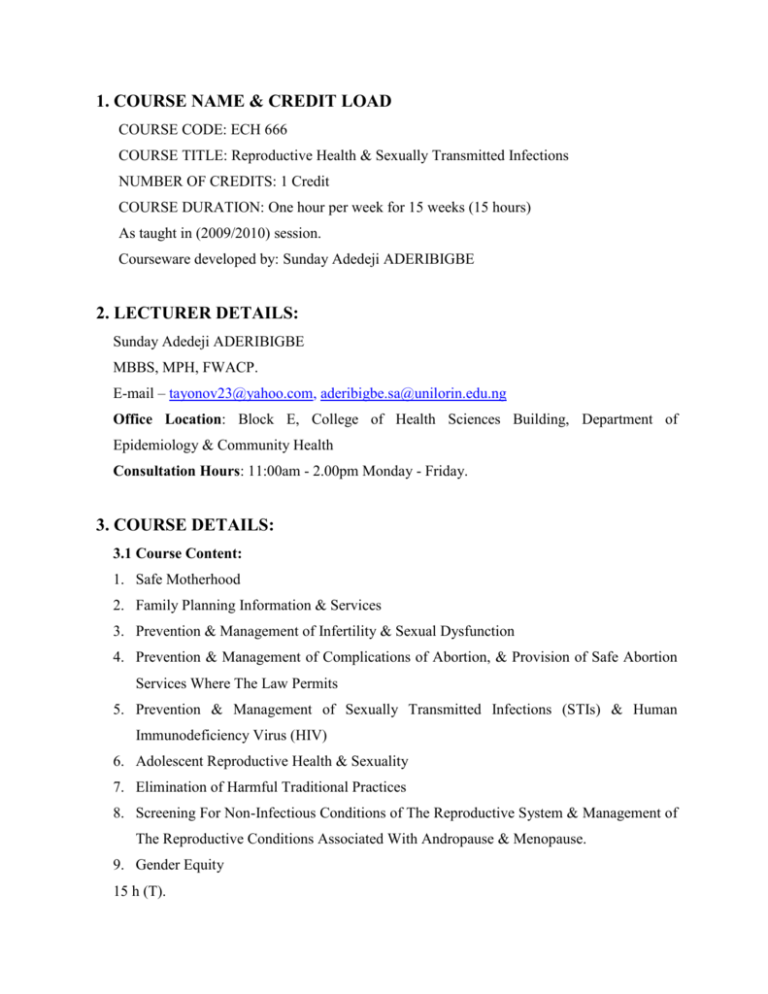
1. COURSE NAME & CREDIT LOAD COURSE CODE: ECH 666 COURSE TITLE: Reproductive Health & Sexually Transmitted Infections NUMBER OF CREDITS: 1 Credit COURSE DURATION: One hour per week for 15 weeks (15 hours) As taught in (2009/2010) session. Courseware developed by: Sunday Adedeji ADERIBIGBE 2. LECTURER DETAILS: Sunday Adedeji ADERIBIGBE MBBS, MPH, FWACP. E-mail – tayonov23@yahoo.com, aderibigbe.sa@unilorin.edu.ng Office Location: Block E, College of Health Sciences Building, Department of Epidemiology & Community Health Consultation Hours: 11:00am - 2.00pm Monday - Friday. 3. COURSE DETAILS: 3.1 Course Content: 1. Safe Motherhood 2. Family Planning Information & Services 3. Prevention & Management of Infertility & Sexual Dysfunction 4. Prevention & Management of Complications of Abortion, & Provision of Safe Abortion Services Where The Law Permits 5. Prevention & Management of Sexually Transmitted Infections (STIs) & Human Immunodeficiency Virus (HIV) 6. Adolescent Reproductive Health & Sexuality 7. Elimination of Harmful Traditional Practices 8. Screening For Non-Infectious Conditions of The Reproductive System & Management of The Reproductive Conditions Associated With Andropause & Menopause. 9. Gender Equity 15 h (T). 3.2. Course Description: The course is designed to introduce students in the Faculty of Clinical Sciences and most especially students in the Masters Programme of the Department of Epidemiology And Community Health to the issues in reproductive health and sexually transmitted infections. The course examines all the issues that have to do with maintaining a healthy reproductive life from the perspective of public health. The epidemiology and control of some common STIs will also be discussed in details. Socio-cultural and economic problems and challenges of reproductive health will also be discussed. 3.3 Course Justification: Reproductive health is an important component of general health. It is a prerequisite for social, economic and human development. At each stage of life individual needs differ. However, there is a cumulative effect across life’s course with events at each phase having important implications for future well-being. Failure to deal with reproductive health problems at any stage in life sets the scene for later health and developmental problems. The highest attainable level of health is not only a fundamental human right for all, it is also a social and economic imperative because human energy and creativity are the driving forces of development. Such energy and creativity cannot be generated by sick tired people and consequently a healthy and active population becomes a prerequisite of social and economic development. 3.4 Course Objectives: At the end of the course, the students will be able: To list the components of reproductive health To understand the public health issues around each of the reproductive health components To understand the epidemiology and control of common Sexually Transmitted Infections To examine some socio-cultural and economic challenges peculiar to reproductive health in developing countries as opposed to that of the developed countries. To examine topical issues in reproductive health. 3.5 Course Requirements: This is an optional course for all students studying for Masters in Community Health. However, students who offer the course are expected to participate in all the course activities and have minimum of 75% attendance to be able to write the final examination. They will also be expected to treat the study questions and assignments. 3.6 Methods of grading: 1. Class Assignments/Test 30 2. Comprehensive Final Examination 70 Total 100 3.7 Course Delivery Strategies: The lecture will be delivered through face-to-face method, theoretical material (lecture note) provided during lecture. Students will be encouraged and required to read around the topics and follow current issues in the media. The delivery strategies will also be supported by tutorial sessions and review of study questions. Reading List: 1. Short Textbook of Public Health Medicine by Adetokunbo O. Lucas & Herbert M. Gilles. 2. FMOH policy and operational documents on each component of Reproductive Health. 3. Internet Search. 4. Preventive And Social Medicine. By Parks 4.0 LECTURE CONTENT Week 1: Safe Motherhood Objective: The student will be able to explain the concept of Safe Motherhood Description: The course outline will be introduced with a review of the safe motherhood initiative, statistics on maternal mortality from around the world, the innocent declaration, causes of maternal mortality, phases of delay in maternal mortality, prevention of maternal mortality, barriers to safe motherhood, the midwives service scheme Study Questions: 1. Discuss the safe motherhood initiative? 2. Discuss the phases of delay in maternal mortality 3. Critically appraise the midwives service scheme. Reading List: 1. Short Textbook of Public Health Medicine by Adetokunbo O. Lucas & Herbert M. Gilles. 2. FMOH policy and operational documents on each component of Reproductive Health. 3. Internet Search. 4. Preventive And Social Medicine. By Parks Week 2: Family Planning Information & Services Objective: The objective is for the student to understand the different FP methods and the importance of family planning as a population control strategy and the socio-cultural barriers to FP services and programmes. Description: Definition of family planning, methods of FP, benefits of FP, traditional FP methods, prevalence of FP use worldwide, global unmet needs for contraception, Fp Information, FP services, Nigeria Population policy and FP, Male involvement in FP, Barriers to FP, Misconception/Fallacies to FP use, FP among adolescents. Study questions: 1. Discuss how FP use can be improved in Nigeria? 2. Critically appraise this statement “Adolescents should be made to have access to Contraceptives of their choice” Reading List: 1. Short Textbook of Public Health Medicine by Adetokunbo O. Lucas & Herbert M. Gilles. 2. FMOH policy and operational documents on each component of Reproductive Health. 3. Internet Search. 4. Preventive And Social Medicine. By Parks Week 3: Prevention & Management of Infertility & Sexual Dysfunction Objective: To identify the public health issues arising from infertility and its treatment as well as sexual dysfunction. Description: Definition of infertility, epidemiology of infertility, causes of infertility, Consequences of infertility; Physical, Psychological, Economic, Social. Prevention of Infertility, Sexual desire disorders, sexual arousal disorders, sexual pain disorders, uncommon sexual disorders, epidemiology of sexual disorders, consequences of sexual disorders. Study questions: 1. What is infertility? 2. Discuss the Socio-Cultural implications of infertility in a Nigerian society 3. Enumerate the types of Sexual Disorders Reading List: 1. Short Textbook of Public Health Medicine by Adetokunbo O. Lucas & Herbert M. Gilles. 2. FMOH policy and operational documents on each component of Reproductive Health. 3. Internet Search. 4. Preventive And Social Medicine. By Parks Week 4: Prevention & Management of Complications of Abortion, & Provision of Safe Abortion Services Where The Law Permits Objective: The objective of this weeks’ lecture is for the student to be able to understand the public health implications of abortion and the attendant topical issues surrounding the provision of abortion services. Description: Definition of abortion, epidemiology of abortion, types of abortion, abortion in specific groups eg adolescents, complications of abortion, prevention of abortion, Consequences of abortion; Physical, Psychological, Economic, Social. Management of complications of abortion, abortion laws. Study questions: 1. Discuss the various abortion laws and discuss the advantages and disadvantages of each type of law. 2. What is the public health importance of abortion? Reading List: 1. Short Textbook of Public Health Medicine by Adetokunbo O. Lucas & Herbert M. Gilles. 2. FMOH policy and operational documents on each component of Reproductive Health. 3. Internet Search. 4. Preventive And Social Medicine. By Parks Week 5: Prevention & Management of Sexually Transmitted Infections (STIs) & Human Immunodeficiency Virus (HIV) Objective: The main objective is for the student to be able to understand the epidemiology and control of common sexually transmitted infections as well as the sociology of these infections and the legal and economic aspects of their control. Description: Definition, Classification of STIs, Epidemiology of STIs generally and specifically, Sociology of STIs, Control of STIs, At Risk Groups, Syndromic management of STIs, Prevention of STIs, Consequences of STIs; Physical, Psychological, Economic, Social. Study Questions: 1. “Commercial Sex Work should be legalized and the practitioners made to undergo registration” Critically appraise this statement. 2. Discuss the sociology of HIV/AIDS. 3. Classify STIs with relevant examples Reading List: 1. Short Textbook of Public Health Medicine by Adetokunbo O. Lucas & Herbert M. Gilles. 2. FMOH policy and operational documents on each component of Reproductive Health. 3. Internet Search. 4. Preventive And Social Medicine. By Parks Week 6 & 7: Adolescent Reproductive Health & Sexuality Objective: The objective of the lecture is to understand the various aspect of adolescent reproductive health and sexuality. Description: Introduction to adolescent reproductive health, adolescent sexuality, sexual behavior of adolescents, early marriage, adolescent reproductive health problems, role of mass media and internet, adolescent reproductive health needs, adolescent friendly health services, family life education. Study questions: 1. Who is an adolescent? 2. What are the characteristics of an AFHS? 3. Discuss the reproductive health needs of adolescents. Reading List: 1. Short Textbook of Public Health Medicine by Adetokunbo O. Lucas & Herbert M. Gilles. 2. FMOH policy and operational documents on each component of Reproductive Health. 3. Internet Search. 4. Preventive And Social Medicine. By Parks Week 8 & 9: Elimination of Harmful Traditional Practices Objective: The objective of the lecture is to understand the public health issues surrounding some common harmful traditional practices in Nigeria and elsewhere in the world. Description: Common harmful practices in Nigeria, epidemiology of these practices, Reasons why they are still being practiced, legislation and enforcement, harmful practices in other parts of the world, public health implication of these practices. Study questions: 1. Discuss the public health importance of Female Genital Cutting? 2. Discuss the epidemiology and control of wife hospitality 3. Discuss the determinants of domestic violence in Nigeria. Reading List: 1. Short Textbook of Public Health Medicine by Adetokunbo O. Lucas & Herbert M. Gilles. 2. FMOH policy and operational documents on each component of Reproductive Health. 3. Internet Search. 4. Preventive And Social Medicine. By Parks Week 10 & 11: Screening For Non-Infectious Conditions of The Reproductive System & Management of The Reproductive Conditions Associated With Andropause & Menopause Objective: The objective of the lecture is to examine the concept of screening with regards to conditions of the reproductive system and to examine the public health issues around andropause and menopause. Description: Introduction to screening, principles of screening in public health practice, screening for common reproductive tract cancers, public health importance of andropause and menopause. Study questions: 1. Discuss the public health importance of Screening 2. Discuss the principles of screening in public health practice 3. Discuss the epidemiology and control of breast cancer/cervical cancer. Reading List: 1. Short Textbook of Public Health Medicine by Adetokunbo O. Lucas & Herbert M. Gilles. 2. FMOH policy and operational documents on each component of Reproductive Health. 3. Internet Search. 4. Preventive And Social Medicine. By Parks Week 12 & 13: Gender Equity Objective: The objective of the lecture is to examine the concept of gender and the role of gender mainstreaming in public health programmes. Description: Definitions, Gender equality, gender equity, gender inequality, factors that promote gender inequality, male dominance, legal and constitutional issues, gender sensitivity in society, promoting gender equality, gender equality and achievement of the MDGs, gender mainstreaming, male involvement. Study questions: 1. Differentiate between gender equity and gender equality. 2. What is gender mainstreaming? Reading List: 1. Short Textbook of Public Health Medicine by Adetokunbo O. Lucas & Herbert M. Gilles. 2. FMOH policy and operational documents on each component of Reproductive Health. 3. Internet Search. 4. Preventive And Social Medicine. By Parks Week 14: Class Test Description: The students will be assessed on all the treated topics for 45 minutes. Week 15: Revision/ Tutorial Exercises Description: Students are expected to seek explanation on any difficult concept or topics treated during the course. Study Questions: 1. Discuss the safe motherhood initiative? 2. Discuss the phases of delay in maternal mortality 3. Critically appraise the midwives service scheme. 4. 1. Discuss how FP use can be improved in Nigeria? 5. 2. Critically appraise this statement “Adolescents should be made to have access to Contraceptives of their choice” 6. What is infertility? 7. Discuss the Socio-Cultural implications of infertility in a Nigerian society 8. Enumerate the types of Sexual Disorders 9. Discuss the various abortion laws and discuss the advantages and disadvantages of each type of law. 10. What is the public health importance of abortion? 11. “Commercial Sex Work should be legalized and the practitioners made to undergo registration” Critically appraise this statement. 12. Discuss the sociology of HIV/AIDS. 13. Classify STIs with relevant examples 14. Who is an adolescent? 15. What are the characteristics of an AFHS? 16. Discuss the reproductive health needs of adolescents. 17. Discuss the public health importance of Female Genital Cutting? 18. Discuss the epidemiology and control of wife hospitality 19. Discuss the determinants of domestic violence in Nigeria. 20. Discuss the public health importance of Screening 21. Discuss the principles of screening in public health practice 22. Discuss the epidemiology and control of breast cancer/cervical cancer. 23. Differentiate between gender equity and gender equality. 24. What is gender mainstreaming? Where Reading List Can Be Obtained: University Library University Bookshops Internet. Personal collections Departmental Library
